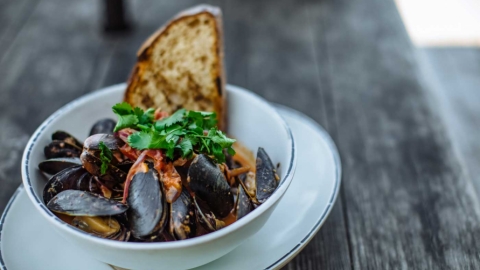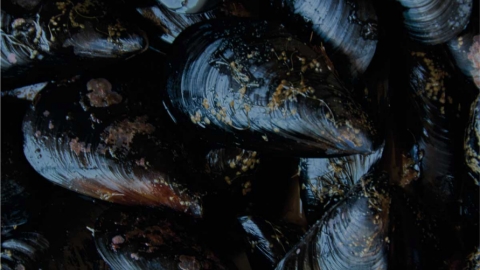Fish: Celebrating 20 Years and a Commitment to Renewable Seafood
Achieving 20 years in the business is no mean feat for any restaurant. For Sausalito’s Fish, staying open meant not only operating a restaurant committed to serving renewable fish and seafood but building an ecosystem—a community of families, fishers and chefs that are a restaurant’s lifeblood. The vision of co-owners Kenny Belov and Bill Foss? To serve no seafood that doesn’t support a healthy future for earth’s oceans and humanity’s food supply. The restaurant, however, is just the beginning of this fish story.
Since April 17, 2004, when Fish opened its doors next to a bait shop on the waterfront, the restaurant has stayed true to its owners’ exacting standards, supporting and spawning ancillary projects and businesses that support the Bay Area’s demand for fresh seafood on the table without devastating the ocean. Perhaps most recognizable is Foss and Belov’s TwoXSea.
Founded in 2009, the wholesale business works directly with fishermen to harvest and sell fish and seafood with honesty and transparency of catch methods, harvested in season, and zero resource depletion as the throughlines. While TwoXSea operates out of Pier 45 in San Francisco’s Fisherman’s Wharf neighborhood, local fishermen pull up to a Sausalito dock to supply the restaurant.
Lured to open a wholesale business in Portland, Oregon, in 2015, TwoXSea also runs a retail counter inside Portland’s Providore Fine Foods. As at the Sausalito restaurant, “the culture of TwoXSea is relationship-based,” says Belov, who is at the San Francisco pier before dawn most mornings. “I’m texting chefs at 5am, helping them write their menus.” His most powerful word? “No,” Belov says. “But we give them a renewable substitution that will positively impact the health of our ocean.”
Though Belov gave up commercial salmon fishing and sold his boat years ago, he continues to support fishers with purchase commitments to maintain the renewable fish pipeline. A single boat in western Alaska supplies all the cod for the restaurant’s fish and chips, for example. With steadfast effort, TwoXSea built a community of boats from Alaska to Hawaii, Louisiana to Maine. These relationships are an important part of the Fish ecosystem, allowing fishers to make a steady living.
Only wild salmon, in season or frozen, is served at Fish as Belov steadfastly refuses to support the salmon farming industry. Net pens, where most farmed salmon are raised, benefit from free chilled water. They eat pelletized forage fish, a free resource pulled from the world’s oceans, dried to 10% of their original weight, concentrating toxins within the fish and creating wastelands within the ocean food web. “It’s the cheap, destructive alternative, competing against a hook-and-line fisherman with a mortgage to pay on his boat,” says Foss. And that’s just the beginning of the farmed problem—we won’t get started on the antibiotics problem. “It’s a dead end,” Belov says. “You are robbing Peter to pay Paul.” Belov, Foss and the team refuse to kick the can down the road.
Though Belov and Foss are concerned that attitudes have shifted since Covid times with fewer customers concerned about where their seafood comes from or how it was harvested (recent studies show that 87% of the world’s wild fisheries are overexploited, including bait fish used in aquaculture), their efforts at renewable seafood and fish continue.
In search of ways to make aquaculture a viable option to wild fish, Belov and Foss began working with McFarland Springs’ trout farm owner David McFarland in 2009. They worked with Dr. Rick Barrows, a USDA researcher, who looked at plant-based materials that could provide needed nutrients for the trout to grow. “He took out fish but not fish oil,” Belov says. They asked Barrows to remove the byproducts of industrial agriculture—bone meal, feather meal, blood meal and chicken byproducts —out of the feed. The resulting 100%-plant-based pellets, milled in Southern California by an animal feed manufacturer, provide the fish with needed nutrients, sourced from marine and freshwater algae, flax and waste from California’s nut industry. Their efforts resulted in the popular McFarland Springs trout hot dog that took away a Good Food Award this year.
Restorative aquaculture, the antithesis to net k pens, according to Foss, is the way forward. Recently, Belov and Foss began extending their reach in aquaculture with a pilot program with the Nature Conservancy and Bodega Marine Laboratory on a land-based aquaculture program at San Francisco’s Fisherman’s Wharf with so-called “zombie uni,” one of many well-documented negative results of the manye heat wave and kelp forest devastation off California’s coast between 2014 and 2016. As with the trout, the land-based experiment with the spiky purple sea creatures could make them a viable food source, plump enough to harvest and put on menus. “We want to see if we can do it,” Foss says. The facility’s expected opening date? Late 2024.
Another restorative aquaculture pilot project is underway with Moss Landing Marine Laboratories, where Dr. Mike Graham is working with monkey-faced eel on an unagi replacement program. Current demand for unagi, and overfishing especially in Japan, have pushed Anguilla japónica to the brink. It was placed on the endangered species list in 2013. Monkey-faced eel, if the team’s pilot is successful and can be replicated, may be the only alternative. The first test batch has been smoked. Sauce is in the works. “We are trying to build restorative practices in every aspect of our business,” Foss says. “The true test is putting the product in front of our customers.”
Back at Fish, the team, many of whom have been on board since Day One, is working to utilize 100% of every fish that comes through the restaurant with zero waste. There’s the trout hot dog. Buffalo wings are made out of Coho salmon cheeks. Cuts and ends turn into stock used for pasta dishes, as a base for leche de tigre and soups, and more. The team still hasn’t figured out what to do with fish stomachs. Fish haggis? “Will it sell?” says Foss.
Foss and Belov still love their work. And that’s the point. The only alternative to the steady, day-by- day effort is a renewable, farmed solution. “We’re eucatastrophic,” says Foss, using a term coined by J.R.R. Tolkien that pulls together the Greek prefix for “good” with “catastrophe.” Has the ocean’s tipping point for free bait fish been reached? Will humans continue to heat the oceans yet demand more fish? Will chefs buy Foss and Belov’s restoratively grown uni and unagi? Will customers keep coming? Those questions are TBD.
“We take the optimistic view,” Belov says. As for the Fish food, it speaks for itself.
Fish Restaurant
350 Harbor Dr., Sausalito
331fish.com










